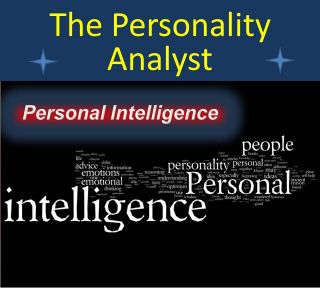Intelligence
Emotional Intelligence…and Now Personal Intelligence?
A first look at the concept from Psychology Today magazine
Posted March 18, 2014


It was Aristotle who urged philosophers (and by extension, today’s scientists) to “carve nature at the joint.” (Think of how carving a Thanksgiving turkey at its joints recognizes the bird’s basic parts). My conception of a personal intelligence is an attempt to carve an important group of intelligences using meaningful boundaries.
I’ve chosen three intelligences to compare—personal, emotional, and social— because they are “hot” intelligences: They deal with hot information—information to which we are personally reactive. Hot information may burn us, warm our hearts, or make our blood boil. Emotions are hot; many aspects of our self-concept are hot; social controls and social power are hot. To further develop the idea of these three intelligences, I’ll define them as I view them:
Personal Intelligence concerns our understanding of the personality system itself—our ability to reason both about our own personality and the personalities of other people. Personality, in turn, is the organization of our major mental systems: our motives and emotions, thoughts and knowledge, plans and styles of action, and awareness and self-control.
Emotional intelligence is the ability to reason validly with emotions and with emotion-related information, and to use emotions to enhance thought—it consists of a coherent set of skills. Others have added concepts like “superoptimism,” “persistence,” and “zeal” to describe people with emotional intelligence, but those terms describe motives not emotions, and attempts to measure such qualities indicate that they are not related to the ability to reason about emotions.
Social intelligence is the capacity to understand social rules, customs, and expectations, social situations and the social environment, and to recognize the exercise of influence and power in social hierarchies. It also includes an understanding of intra- and inter-group relations.
Other researchers might carve up these areas of reasoning differently. For example, Howard Gardner placed self-understanding in an “intrapersonal” intelligence and understanding others in an “interpersonal intelligence.” He also added social expectations, social power and the like to interpersonal intelligence. I believe there are several good reasons to group together our understanding of our own and others’ personalities. For example:
- We use the same language of traits (e.g., happy-go-lucky, shy, intelligent) to describe both ourselves and others
- We use the same reasoning about plans and goals to evaluate whether our own plans and goals make sense and whether other people’s plans and goals make sense, and
- We cannot evaluate how much of a trait we have (or any other personal quality) except by comparing ourselves to others. Therefore, understanding ourselves is inextricably linked to understanding other people.
The context of these three intelligences
I view these three intelligences as “broad”intelligences—a technical label in this instance. To understand the meaning of “broad” in this context, think of intelligences as arranged in a three-level hierarchy, rather like an organizational chart with the CEO at the top, managers at the next level, and staff at the bottom. General intelligence is in the “CEO” position at the top. Broad intelligences like verbal intelligence, perceptual-organizational (originally called “mechanical”) intelligence, memory intelligence, speediness in thinking, spatial intelligence and other qualities occupy the second level. Emotional intelligence (measured as an ability, as I have defined it with my colleagues) may be one of these broad intelligences—and so, I expect, may be personal and social intelligences.
Personal intelligence may be next to emotional intelligence in that second tier of intelligences or, given that personal intelligence broadens the idea of emotional intelligence, emotional intelligence may be moved beneath personal intelligence. (The exact placement of intelligences is adjudicated by their empirical relationships). This makes sense because personal intelligence, relative to the emotional, adds to the mix, motives, knowledge, plans of action and self-control. I believe personal intelligence is a powerful concept because it helps us to focus on more parts of who we are than our feelings alone.
My colleagues and I are now able to specify the knowledge and logic involved in reasoning about personality specifically enough to measure people’s skill at it—and that is an advance of consequence. Once we understand that, we can look at people who are especially talented in this area and see how they use their reasoning about personality in their lives.
In my book “Personal Intelligence” I’ve had the opportunity to look at the relevant reasoning people carry out about personality in their everyday lives and to see the effects that can have on how they fare. I’m hopeful that I’ve learned a few things about personality from the highly talented individuals I’ve profiled, as well as from the people my colleagues and I have studied who measure high in personal intelligence on lab measures we have developed.
The issue of Psychology Today magazine that excerpts and adapts several passages from the book nicely conveys some of the excitement I’ve felt as I've explored these areas.
Notes
For more details on emotional intelligence, see my earlier post, "What Emotional Intelligence Is and Is Not."
Copyright © 2014 John D. Mayer




